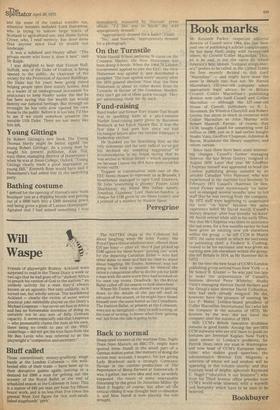Spectator April 26, 1975
and the maze of the capital transfer tax. Attentive listeners included Lord Dulverton, who is trying to restore large tracts of Scotland to agricultural use, and Dame Sylvia Crowe, who, I read recently, has done more than anyone since God to mould our landscape.
It was a subdued anti-Healey affair. "The private owner who loves it, does it best", said Sir Ralph.
I was delighted to hear that Euston Hall, Suffolk, seat of the Duke of Grafton, is being opened to the public. As chairman of the society for the Protection of Ancient Buildings, the Duke has for years been going round helping people open their stately homes. And as a leader of an underground movement for aristocrats to keep Healey under the bed he has been saying that the wealth tax would destroy our national heritage. But through an oversight he has only now opened his own house to the public. Before it is too late, I'd like to see if we could somehow preserve the amiable 11th Duke. There are not many like him left.
Young Gittings
Dr Robert Gittings's new book The Young Thomas Hardy might be better signed 'the young Robert Gittings'. As a young man he taught his present publisher, Alan Hill, sixty-three, managing director of Heinemann's when he was at Jesus College, Oxford. "Young Gittings clearly made a good impression on young Hill," Kenneth Rose would have said if Heinemann's had asked him to the launching party.
Bathing costume
arrived for the opening of Harrod's new 'bath boutique' just as a dripping blonde was getting out of a £600 bath into a £200 dressing gown and being given a glass of Lanson champagne.' Agitated that I had missed something I was immediately reassured by Harrods' press officer, "I'd like you to know she was appropriately dressed."
"Appropriately dressed for a bath?" I said. "No," said Harrods, "appropriately dressed for a photograph."
On the Turnstile
While Harold Wilson performs W-turns on the Common Market, the New Statesman has been doing S-bends. When the 1964-70 Labour • Government applied to join the EEC, the New Statesman was against it, and distributed a pamphlet 'The case against entry' shortly after the 1970 general election. Now that the New Statesman is about to come down from its Turnstile in favour of the Common Market, they can't get rid of them quick enough. They are advertising them for 9p each.
Fund-raising
Band leader and former Tory leader Ted Heath was in sparkling form at a pro-Common Market fund-raising party given by Baroness Bentinck at her Eaton Square flat. It was the first time I had seen him since we had exchanged letters after the terrible February 4 leadership election. He thanked me for describing him as the only statesman and the only radical we've got but declined my 'tempting suggestion' of accommodation in my house saying that he was settled in Wilton Street — which surprised me because I know the IRA have destroyed his stereo outfit.
Trapped in conversation with one of the EEC bores chosen to represent us in Brussels, I nonetheless managed to spot I.ord Gladwyn, Sir John 'everything is gloomy' Foster, Lord Shackleton, my friend Mrs Julian Amery, Jonathan Guinness, Lord Duncan-Sandys, a cheque for £120 given by the Heim Gallery and a portrait of a monkey by Ruskin Spear.
Peregrine










































 Previous page
Previous page